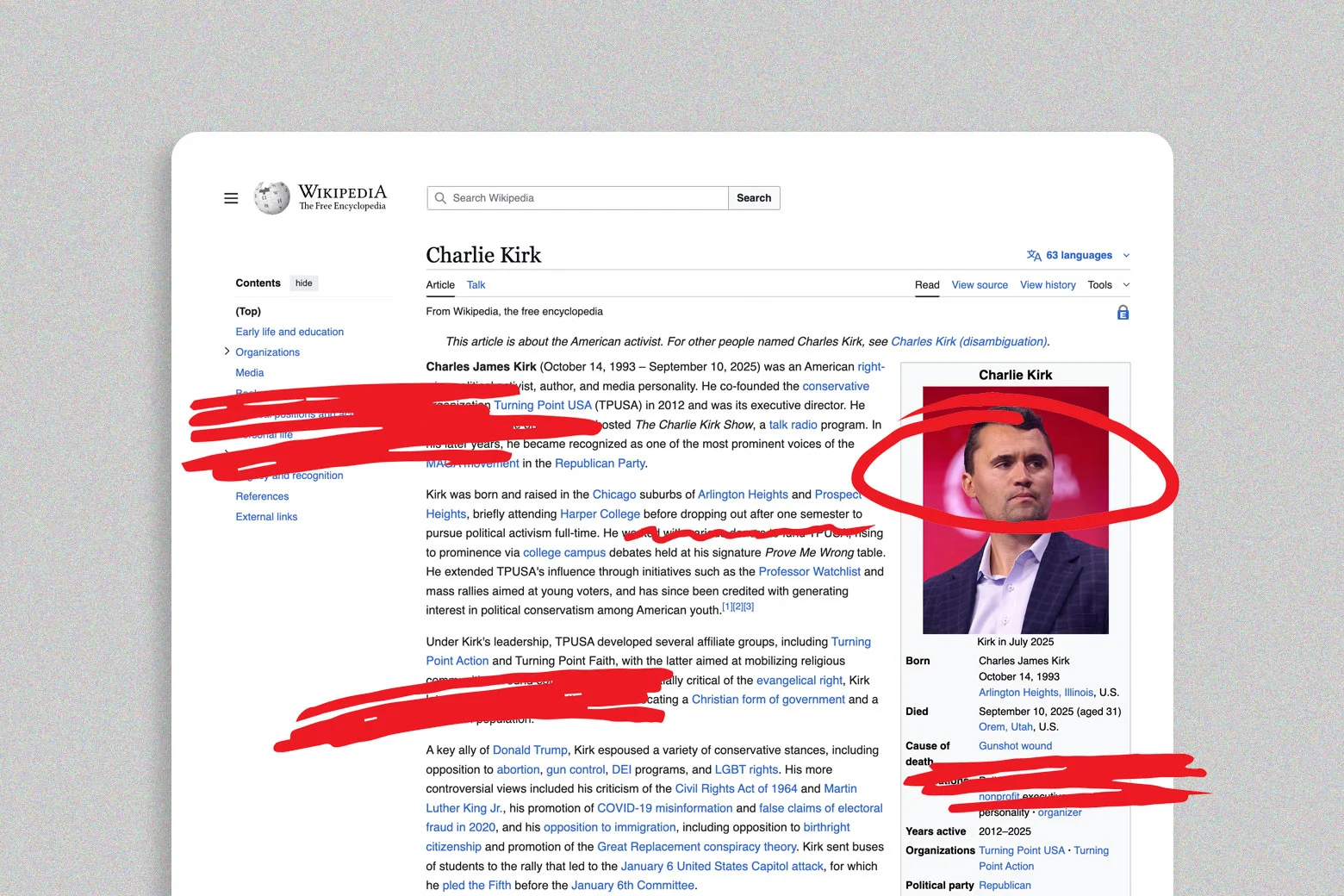
Sign up for the Slatest to get the most insightful analysis, criticism, and advice out there, delivered to your inbox daily.
In a shocking display of political violence, 31-year-old conservative activist Charlie Kirk was fatally shot on Sept. 10 while he was speaking at Utah Valley University in Orem, Utah. Since then, right-wing commentators have begun to hammer familiar targets: universities supposedly corrupting the youth with liberal indoctrination, campus administrators who failed to protect free speech, and leftist online communities and a transgender individual allegedly connected to the accused shooter.
Those are predictable villains in MAGA’s long-running culture war. Less obvious is the latest addition to the roster of enemies: Wikipedia. Utah Sen. Mike Lee went so far as to post on X on Friday that “when it comes to Charlie Kirk, they’ve gone out of their way to put the ‘wicked’ in Wikipedia.”
Over the past week, right-wing media outlets have turned up their fury toward the free encyclopedia to a degree rarely seen in its 24-year history. Fox News published a piece by Ashley Rindsberg alleging that “Leftist Wikipedia Editors Twist Facts in a Shameless Move to Smear Charlie Kirk.” Another Fox story framed a routine editorial debate as an effort to “erase” Kirk’s widow via her Wikipedia page. The message from Fox is that Wikipedia’s thousands of unpaid volunteers are a cabal of ideologues working around the clock to tarnish Kirk’s memory and memory-hole his grieving family.
There’s something deeper at work than merely creating pieces for hate clicks. These attacks aren’t legitimate efforts to describe how Charlie and Erika Kirk are portrayed on Wikipedia. The point of the right-wing stories is to delegitimize Wikipedia itself, undermining the project’s effort to archive facts using reliable sources. Because the endgame for Wikipedia’s bad-faith attackers is post-truth. The political subordination of reality.
This strategy of smearing Wikipedia in bad faith becomes more obvious when you examine the actual claims published by right-wing media. Rindsberg, writing for Fox News, insists that Wikipedia’s editors are “pushing a left-wing narrative about Kirk,” and that this distortion is dangerous because it appears in Google search results and A.I. summaries. But as journalist (and longtime Wikipedia editor) Molly White pointed out on X and Bluesky, the Wikipedia entry is doing what an encyclopedia is supposed to do, documenting what Kirk said—again and again, in public.
No matter how badly critics want to believe otherwise, Wikipedia’s volunteers are not permitted to insert their own opinions. Instead, the rule is to reflect what reliable sources say. That’s why Kirk’s page cites the New Yorker for his claim that university campuses are “islands of totalitarianism,” and WIRED for his declaration that passing the Civil Rights Act of 1964 was a “huge mistake.” Critics argue that Wikipedia cherry-picks “leftist” outlets, or that mainstream media skews left overall. (The counterargument is that many conservative media sites do not effectively distinguish opinion pieces from factual reporting, and that they fail to issue retractions when they get things wrong.) But whether the citation is from the left-leaning Guardian or the right-leaning Washington Examiner, Kirk’s words remain Kirk’s words. A man who went on record calling Martin Luther King Jr. “awful” and the separation of church and state “a fabrication” has no shortage of reliable sources describing him as “controversial.”
Some conservative backlash seems to come from the idea that Kirk’s page should double as an online memorial, smoothing away his edges out of respect for the ghastly way he died. But Wikipedia is not a shrine. The site’s biographical articles are meant to be factual, not flattering, and even widely admired historical figures do not have whitewashed pages. For instance, Abraham Lincoln’s entry details his controversial suspension of habeas corpus, and Martin Luther King Jr.’s page covers both his graduate school plagiarism and his extramarital affairs. The reason Wikipedia articles aren’t hagiographies is because they’re not supposed to be.
Since Kirk’s assassination, some conservative influencers have challenged the article’s title. They ask why it’s currently named “Killing of Charlie Kirk” instead of “murder” as in “Murder of George Floyd.” The allegation is that editors are downplaying conservative deaths, but in reality they’re following the long-standing norm not to use “murder” until there’s a conviction, which hasn’t happened in Kirk’s case. For reference, the article on the death of George Floyd wasn’t renamed “Murder” until Derek Chauvin’s conviction nearly a year later.
The term assassination would be more precise, but remember that Wikipedia mirrors the language of reliable sources. As veteran Wikipedia administrator Anne Clin (who edits under the name Risker) told me, very few outlets used the word assassination in the first days after Kirk’s death, and Wikipedia’s policy is to represent viewpoints in proportion to the prominence of that viewpoint in the underlying sources. However, Risker has noticed a shift in language this week and expects the article will be retitled. “I expect that to move—maybe not immediately, but fairly soon, because that’s clearly where the sources are going,” Risker said. At the time of this article’s publication, a discussion about renaming the page “Assassination of Charlie Kirk” is underway. Interestingly, this year’s politically motivated assassination of Minnesota House Speaker Melissa Hortman and her husband is titled “2025 Shootings of Minnesota Legislators,” to align with the wording used by the majority of sources.
On Sunday, Fox News ran a second piece, this time claiming Wikipedia was trying to “erase” Kirk’s widow, Erika. The reality is far more mundane. For context, it’s very common for new biographical Wikipedia entries to be nominated for deletion. In Erika’s case, the nominating editor argued that her notability was largely “inherited” from her husband or limited to her experience performing in beauty pageants. In Wikipedia jargon, she wasn’t “independently notable.”
The framing by Fox News makes it sound like Wikipedia editors collectively are heartless. But in fact, the actual discussion of whether or not to keep the page was filled with sympathy. “We recognize her as a human being who’s going through a horrendous, traumatic experience. She’s a mother with young children,” said Risker. “There’s an element of psychological trauma that we see throughout society. That shows up on Wikipedia, too.”
Even editors who favored merging her page into her husband’s expressed sorrow for her loss. Over 150 editors participated in the discussion, and by Tuesday, the debate was closed with what’s called a snowball keep, which is Wikipedia-language for a consensus so lopsided the result is obvious. Fox framed Erika Kirk’s Wikipedia page as if it were on the chopping block, but in reality, her article was kept with a clear consensus and with a 4–1 ratio of editors voicing support.
The Fox News article about Erika Kirk’s entry mirrors another recent piece by Ashley Rindsberg, this time in the Free Press, about Wikipedia’s coverage of the killing of Iryna Zarutska, a 23-year-old Ukrainian refugee stabbed to death on a Charlotte, North Carolina, train in August, for which a man, Decarlos Brown Jr., has been charged. The headline in the Free Press claimed “Wikipedia Wants to Erase Her Story.” Like much of Rindsberg’s work, the point isn’t to provide information to readers about what’s happening on Wikipedia, but to stoke further outrage for attention.
After Zarutska’s violent death, an editor nominated the page for deletion (which is, again, extremely common) on the grounds that it did not meet the site’s general notability guidelines. Let’s step back for a moment: Could some Wikipedia editors have political motives for wanting the page gone? Of course. Editors are flawed humans who sometimes let social consequences creep into their judgment, and if that were the case here, it would be wrong. Wikipedia is supposed to be a general encyclopedia, not a vehicle for social engineering.
But politically correct censorship is not what happened here. The deletion discussion is public, and the record shows overwhelming support for keeping Zarutska’s page. Yes, a few commenters made race or culture-based arguments, but most grounded their reasoning in Wikipedia’s policies, like the principle that Wikipedia isn’t a platform for breaking news or local crime reports. As Risker, the longtime administrator, put it: “It was very obvious very quickly that this was going to be a national news story. It was not going to go away. And the keep discussions were considerably more policy-based than the delete discussions.” As was the case with Erika Kirk, an overwhelming majority of editors supported keeping the page compared to a small minority who wanted it deleted.
And yet, you won’t find a Free Press article about that. Just as you won’t find one about how, in the first 24 hours after his death, Wikipedia’s volunteers quickly and quietly protected the Charlie Kirk biographical article from a wave of trollish edits suggesting he “deserved it.” Nothing reported about how Wikipedia’s volunteers deleted this bile within a few minutes or seconds of it being posted.
What should be clear by now is that right-wing media coverage of Wikipedia isn’t actually interested in explaining how the site works. The goal is to undermine Wikipedia’s function as a volunteer-driven project that can produce an independent repository of facts that has (at least historically) been insulated from political interference.
That’s why the House Oversight Committee’s Aug. 27 letter to the Wikimedia Foundation, Wikipedia’s nonprofit parent organization, is so alarming. Chaired by Republicans James Comer and Nancy Mace, the committee claimed to be probing “the efforts of foreign operatives and individuals at academic institutions subsidized by U.S. taxpayer dollars to influence U.S. public opinion.” If there are indeed legitimate efforts by international governments and their surrogates to sway the content of Wikipedia, those should be investigated. But considering the Heritage Foundation’s recent threat to dox Wikipedia volunteers and the steady drumbeat of right-wing attacks on various nonprofit organizations, the House committee’s letter feels less like oversight and more like targeting. As Molly White put it, “I’ve spent the better part of two decades dealing with people trying to dox and harass the volunteers who make Wikipedia the incredible resource it is today. I liked it better when they weren’t in Congress.”
Add it all up—the groundless social media outrage, the bad-faith media stories, and the House Republican investigation—and the strategy becomes obvious: erode public trust in Wikipedia. Because once independent institutions like Wikipedia collapse, the party in power can simply dictate which views are or or not acceptable. The powerful declare the truth on social media, no citation needed.



